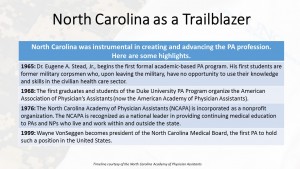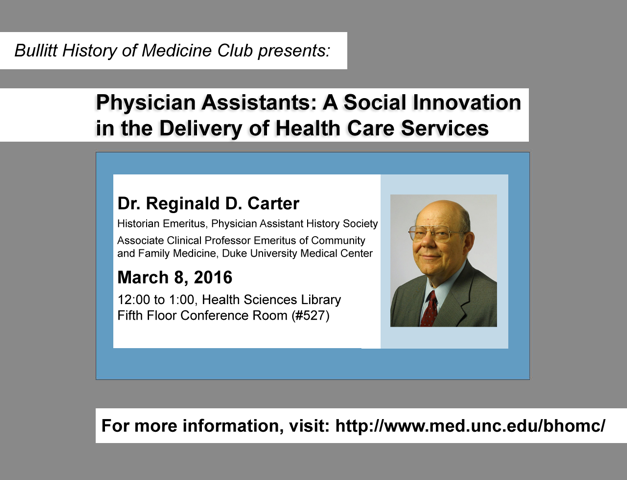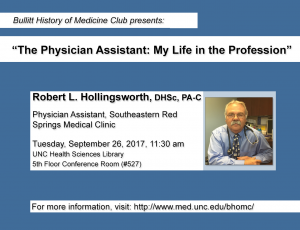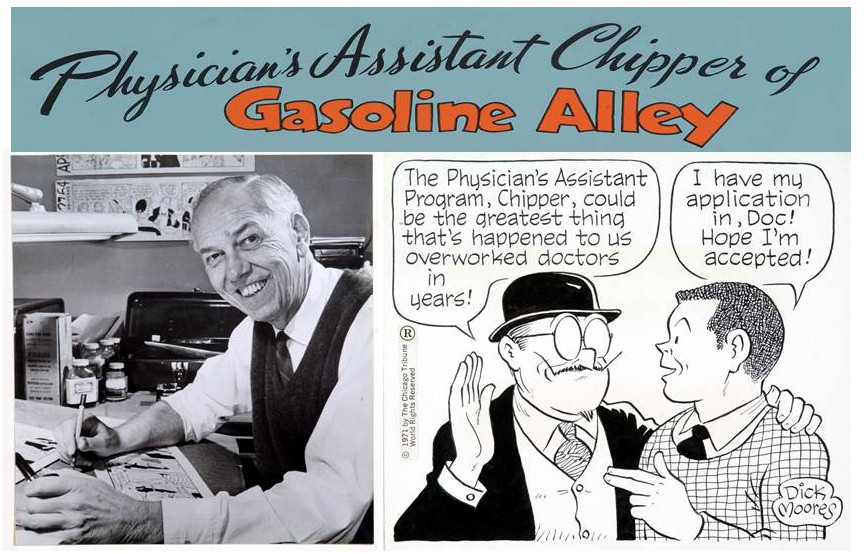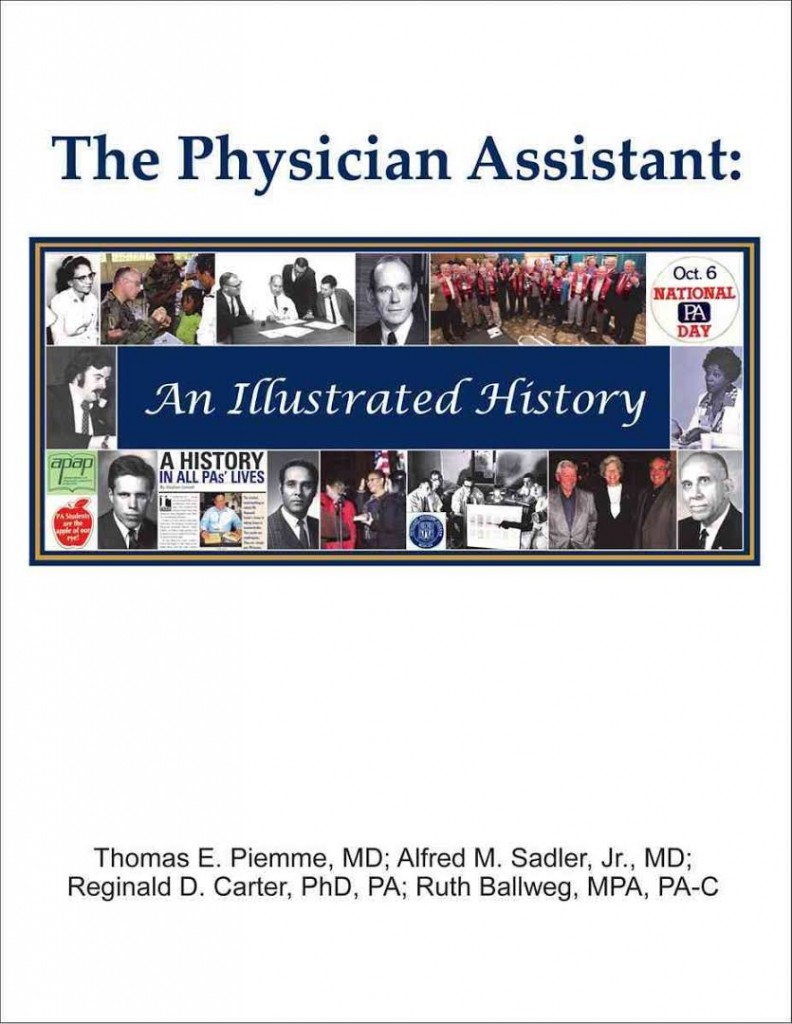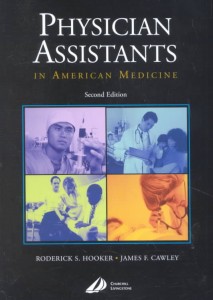History of the Profession
North Carolina as a Trailblazer
Dr. Reginald D. Carter
Robert L. Hollingsworth
Eugene Anson Stead, Jr.: PA Pioneer
Dick Moores and Gasoline Alley
PA Assistant History Society
The North Carolina Academy of Physician Assistants
Stead Center
The Physician Assistant: An Illustrated History
Physician Assistants in American Medicine
More history from the North Carolina Academy of Physician Assistants (NCAPA)
Learn about the history of the Physician Assistant profession from Dr. Reginald D. Carter, Historian Emeritus, Physician Assistant History Society
Bullitt Club Lecture Slides
Bullitt Club Lecture Audio
Learn about Robert Hollingsworth’s experience as a physician assistant in rural North Carolina
Bullitt Club Lecture Audio
More about Robert Hollingsworth on the Surgeon’s Assistant Program page.
Eugene Anson Stead, Jr.: PA Pioneer
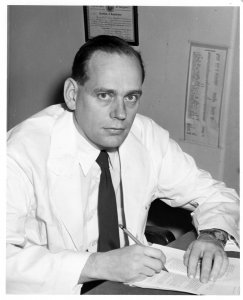
Eugene Anson Stead, Jr. (1908-2005), was chair of the Department of Medicine at Duke University from 1947 to 1967.
In response to an increased demand for services and a shortage of nursing and allied health personnel at Duke University Hospital, Stead established a physician assistant training program in 1965, the first in the nation.
Image courtesy of the Duke University Medical Center Archives
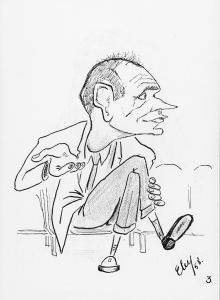
Scalps!, published in 1958, is a 32-page booklet of caricatures of Duke University School of Medicine faculty, including Dr. Stead. All of the artwork was done by Elec LeClerq, an endocrinology resident. The drawings were first seen as part of an exhibit in the doctor’s dining room at Duke University Hospital.
Courtesy of the Duke University Medical Center Archives
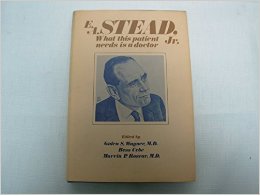
First published in 1978, this book includes aphorisms of Eugene A. Stead, Jr., collected from his former trainees and his publications. Chapter 6, “An Era of Medical Service Has Ended,” includes quotes about the importance of the emerging physician assistant profession.
Dr. Stead’s book in the UNC Health Sciences Library
Article by Eugene Stead, Jr.
Stead EA. PA profession in review: a founder’s perspective. Physician Assist 1986;10(1):12, 19, 22. PMID: 10314618.
One of the PA profession’s most noted founders reflects on its past 20 years’ growth, including his role in initiating the concept and providing direction as the idea took hold. Adapted from an address delivered at the 1985 conference of the North Carolina Academy of Physician Assistants, this article is a candid review of the profession’s past and future, exploring various career opportunities now open to PAs.
Available in print at the UNC Chapel Hill Health Sciences Library
Dick Moores and Gasoline Alley
First published in 1918, Gasoline Alley is one of the longest-running comic strips in the United States. It was created by Frank King, and continued by Bill Perry, Dick Moores, and current writer-artist Jim Scancarelli.
This drawing by Dick Moores shows the character Chipper Wallet, an ex-military corpsman who served with distinction in Vietnam, discussing his application to a physician assistant program. The drawing appeared on the front page of the March 12, 1971, issue of Intercom, the employee newsletter for Duke University Medical Center. An accompanying article indicates that the physician assistant segment of the strip was printed the previous week. This storyline appeared during the early days of the physician assistant profession, when its continuing success was not yet assured.
Image courtesy of the Duke University Medical Center Archives and the Physician Assistant History Center
Dick Moores (1909-1986) was an American cartoonist best known for his work on the comic strip Gasoline Alley. He received the National Cartoonists Society’s Newspaper Comic Strips (Story) Award in 1973, 1980, 1981, 1982 and 1985, as well as the Reuben Award for Outstanding Cartoonist of the Year in 1974.
This photograph appeared in the March 12, 1971, issue of Intercom, the employee newsletter for Duke University Medical Center. An accompanying article indicates that the physician assistant segment of the comic strip Gasoline Alley was printed the previous week.
Image courtesy of the Duke University Medical Center Archives and the Physician Assistant History Center
PA Assistant History Society
The Physician Assistant History Society is dedicated to the history and legacy of the physician assistant profession through the identification and collection of appropriate papers, manuscripts, magazine and newspaper clippings, newsletters, reports, dissertations, oral histories, and visual artifacts, such as films, slides, videos, photographs, and digital images. The society’s headquarters are located in the Atlanta suburb of Johns Creek, Georgia.

The North Carolina Academy of Physician Assistants

Incorporated in 1976, the NCAPA is recognized as a national leader in providing continuing medical education to PAs and NPs who live and work within and outside the state. Over the years, solid lines of communication have been established with the NC Medical Society, the NC Medical Board, and the NC State Legislature.
Stead Center
The Stead Center
In 2006, the North Carolina Academy of Physician Assistants (NCAPA) formally opened the Stead Center, its new headquarters in Research Triangle Park. NCAPA is the first state physician assistant association to own and operate its own headquarters.
The building is named in honor of Dr. Eugene A. Stead, Jr., the father of the physician assistant profession. The Stead Center houses the NCAPA central office and hosts CME workshops, Board of Directors meetings, physician assistant student events, and various other functions relevant to the profession. The building features a replica of Dr. Stead’s home office, complete with furniture, decorations, pictures, and awards that he donated before his death. A formal garden behind the building was also donated by Dr. Stead’s estate.
The meeting wing of the Stead Center, the E. Harvey Estes Conference Center, is named in honor of the physician who oversaw the Duke University Physician Assistant Program in 1969 and is credited with propagating the physician assistant concept nationwide.
NCAPA Headquarters at the Stead Center
PA History at the Stead Center
Search the UNC library catalog for more physician assistant resources
The Physician Assistant: An Illustrated History
Thomas E. Piemme, Alfred M. Sadler, Jr., Reginald D. Carter, Ruth Ballweg
Or check your local library or bookstore
The Physician Assistant History Society’s publication, The Physician Assistant: An Illustrated History, is a history of the people, places, and events that have propelled the concept of the physician assistant from its inception in 1965 to its position in American medicine today.
Physician Assistants in American Medicine
Roderick S. Hooker, James F. Cawley.
Or check your local library or bookstore
Built around introductory courses that orient new PA students to the profession, this comprehensive, up-to-date book traces the origins of physician assisting in the United States and other countries, examining education, career opportunities, and future trends. The 2nd edition reflects the many changes that have taken place recently in health care and physician assistant programs, curriculum, and the profession. It draws on over 750 published papers related to PAs and other health providers, offering an in-depth exploration of the PA role in primary care.

